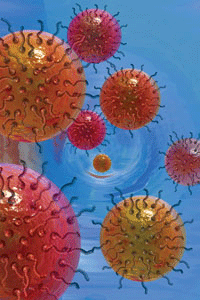Emerging Science Note/Nanorust
Air Date: Week of July 13, 2007

Nanoparticles of rust bind with arsenic in water. (Courtesy of Rice University Office of Media Relations and Information)
Scientists say rust, magnets and olive oil may be the solution to cleaning water with arsenic in developing nations. Ian Gray reports.
Transcript
CURWOOD: It’s Living on Earth. I’m Steve Curwood. Coming up: a giant mill complex from the industrial revolution is being reclaimed for today’s new green revolution. First this Note on Emerging Science from Ian Gray.
GRAY: Mmmm, a big glass of water, fresh, clean…exactly the kind of water that most people in the world don't have.
But, a team of scientists at Rice University is developing a low-tech filter that could help remove at least one unwanted contaminant from drinking water. The prime ingredients? — iron rust, magnets and olive oil.
The widespread contaminant is arsenic, a natural metal in rocks and sediments that can leech into ground water. Conventional ways of getting rid of arsenic are expensive, but the scientists from Rice say they’ve found a way to do it for cheap.

Nanoparticles of rust bind with arsenic in water. (Courtesy of Rice University Office of Media Relations and Information)
Since the nano particles are inexpensive to produce, the technology could be a boon for developing countries where arsenic is a big problem—countries like Bangladesh and Vietnam. The scientists hope they’ll be able to simplify the manufacturing process so that people in these countries can produce the nano-particles themselves. People could then use a low-tech filter and magnet to remove arsenic straight from their well water.
I’ll drink to that.
That this week’s note on Emerging Science, I’m Ian Gray.
Links
“Nanorust Cleans Arsenic From Drinking Water”
The World Health Organization on “Arsenic in Drinking Water”
Living on Earth wants to hear from you!
Living on Earth
62 Calef Highway, Suite 212
Lee, NH 03861
Telephone: 617-287-4121
E-mail: comments@loe.org
Newsletter [Click here]
Donate to Living on Earth!
Living on Earth is an independent media program and relies entirely on contributions from listeners and institutions supporting public service. Please donate now to preserve an independent environmental voice.
NewsletterLiving on Earth offers a weekly delivery of the show's rundown to your mailbox. Sign up for our newsletter today!
 Sailors For The Sea: Be the change you want to sea.
Sailors For The Sea: Be the change you want to sea.
 The Grantham Foundation for the Protection of the Environment: Committed to protecting and improving the health of the global environment.
The Grantham Foundation for the Protection of the Environment: Committed to protecting and improving the health of the global environment.
 Contribute to Living on Earth and receive, as our gift to you, an archival print of one of Mark Seth Lender's extraordinary wildlife photographs. Follow the link to see Mark's current collection of photographs.
Contribute to Living on Earth and receive, as our gift to you, an archival print of one of Mark Seth Lender's extraordinary wildlife photographs. Follow the link to see Mark's current collection of photographs.
 Buy a signed copy of Mark Seth Lender's book Smeagull the Seagull & support Living on Earth
Buy a signed copy of Mark Seth Lender's book Smeagull the Seagull & support Living on Earth

